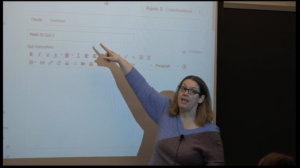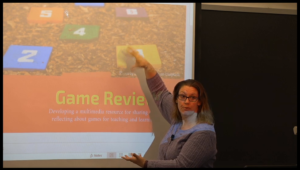Super Sarah
Castleton University professor Rich Clark opened up his computer and went into Canvas. He had used the program before for his classes, but only to post the syllabus and the occasional quiz.
Somewhere in his email was the message from Chancellor Jeb Spaulding announcing the closure of all Vermont state colleges. Classes were being moved online, and Clark had one week to prepare.
He was quick to receive training, but it was a lot to take in.
“It was like drinking from a fire hose that first week,” he said.
Clark stared at his computer screen as he tried to upload a rather large file onto Canvas, but it wasn’t working. He needed to call for assistance.
He knew exactly who to contact.
Castleton’s Educational Technology Specialist Sarah Chambers.
“So, I got her on the phone and she walked me through it, then put out another video to try to help people who might’ve missed that part of it. All of this in one day,” he said. “She got me what I needed and then kind of gave a general patch to others who were probably going to run into the same thing.”
As soon as the decision to move to online classes was announced, Chambers knew it would be her role to step up.
This meant busier days, tireless hours and endless emails. But she was excited.
“I like to be a helper. I think that’s just part of it, I like to help people,” she said.
Chambers spent the transitional week teaching Castleton faculty how to use the educational technology they would need to shift to online classes. She taught the ins and outs of Canvas, Zoom and even specific features within more commonly used services such as Microsoft PowerPoint.

She held seminars in computer labs until the social-distancing restrictions tightened. But she anticipated that, and already had Zoom sessions planned so faculty could tune in remotely. These sessions consumed her mornings, taking about three hours of her day.
Following that, it was time to shift to support. She answered emails and phone calls from the many professors who had their own specific questions.
“It goes so fast, I mean you’re like, ‘Oh, I gotta answer this and then figure out how this works and then try this other thing,” Chambers said. “It’s just like always catching up on what I missed. What six emails did I miss?
“If I was lucky, I took a break and ate lunch,” she said with a smile.
Other parts of her day were spent turning the live Zoom sessions, which were also recorded, into video tutorials. She made informational PDFs as well, just in case some professors could not tune into the streamed sessions.
One professor, Peg Richards, was able to attend one of these sessions. This particular tutorial was about Zoom, a service she did not know much about.
“That was excellent. That taught me everything I needed to know about Zoom and then I just started playing around with it at home,” Richards said.
Cynthia Moulton, who knew nothing about Zoom prior to the transition, was also able to learn a lot from Chambers.
“Now, I’m navigating Canvas, I’m posting YouTube videos in Canvas and I’m meeting my students and advisees regularly via Zoom,” she said. “This experience has changed my whole
outlook on the value of online learning. I can see some real benefits now, and I think I will use many of these tools when I’m back teaching face-to-face.”
As the days went on, Chambers still received many emails. But they weren’t always questions. She began to receive emails from professors showing their appreciation and thanking her for all her help.
“That to me is the piece that keeps me going,” she said. “You know that you’re helping and that, I don’t know, makes you feel like you’re valued. And I think that’s what makes people more motivated to do more.”

And she certainly is valued by professors during these crazy times. In fact, valued may be an understatement. Multiple professors used a different word to describe her.
“Superhero.”
Moulton called Chambers her hero as classes transitioned to online, and she was not the only one.
Heidi Welch, director of music education, already had a pretty good understanding of Canvas and was familiar with Zoom. But her praise for Chambers was no different.
“I can’t say enough about Sarah and her guidance, patience, preparedness and level of talent in IT to guide all of our faculty, staff and students through this unprecedented crisis,” she said. “I don’t know how she did it or where she hides her cape, but she is a superhero and nobody will convince me otherwise.”
Professor Brendan Lalor was the third to call her a superhero, and he gave multiple reasons.
“She’s staying cool under significant pressure and she’s bringing technical and emotional competence to really challenging situations,” he said.
Richards did not use the same adjective, but her praise was nothing short of her colleagues.
“I probably have asked her a million questions and she always answers them. She always knows the answer. So, she’s a real gem. She’s a treasure really,” she said.
And Clark really rounded it all out.
“I mean, it’s her personality, she does it so graciously. She’s humble about it, too,” he said.
But Chambers hasn’t done it all by herself. Although she is taking much of the praise, she said she couldn’t have done it without her own support.
She has her work-study students, and also her “Canvas champions” as she calls them. They consist of professors Gillian Galle and Chris Boettcher.
“Dr. Galle and Dr. Boettcher have been great in just helping things stay organized and making sure I get what I need, and helping keep me sane,” she said. “Everyone’s been really great in making sure I get what I need so I can keep going for everyone else. Which is awesome.”
She also has her colleagues in IT, who are also assisting faculty in any way they can.
But their role is less about teaching the services. They’re making sure everything is running smoothly.
Jonathan Czar highlighted what he and the rest of the IT department have been doing to make the transition smooth.
“Our biggest role has been to get the administration and staff able to work from off-campus. There’s a lot involved with that in terms of privacy and security,” he said. “We had to determine each worker’s needs and what kind of computer they would be using, whether it was owned by the university or whether it was a personal home computer.”
Because home computers are more vulnerable to viruses, IT had to make sure they were connected properly, Czar said.
It’s certainly a team effort in helping with a seamless transition, but even Czar had praise for Chambers and the work she’s done.
“Sarah immediately scheduled and created training sessions all day, for an entire week to help faculty have a better understanding of what they could do with Canvas,” he said. “I think it shows that she’s a person who is willing to do what is necessary to the best of her ability. She stepped up.”
Gayle Malinowski, the chief technology officer in IT and Chambers’ supervisor, is happy to have her in the department.
“Sarah is amazing and she really cares about people,” Malinowski said. “She has a great work ethic and she’s incredibly patient. I’ve always been impressed with the work that she does. Seeing her tackle this almost impossible task just emphasizes that. Castleton is fortunate to have her.”
It’s no secret the positive impact that Chambers has had on campus. Moulton even said that she saved the semester.
In times of crisis, there are some who rise up to the occasion to help those in need. Sarah Chamber is certainly one of them.
When asked if she had any final words, Richards had one last thing to say in regard to Chambers.
“Please Sarah, don’t ever leave,” she said.






